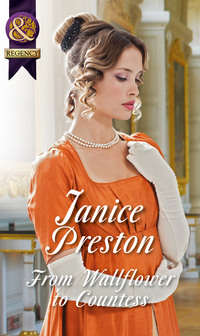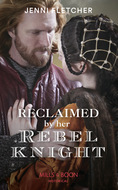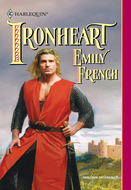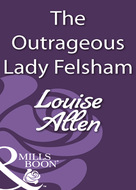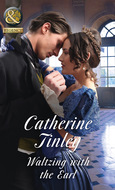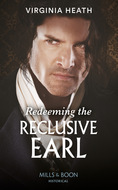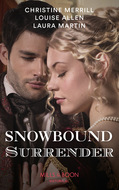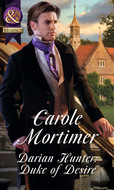Książki nie można pobrać jako pliku, ale można ją czytać w naszej aplikacji lub online na stronie.
Czytaj książkę: «From Wallflower To Countess»
About the Author
JANICE PRESTON writes sensual and heartwarming historical romance. Although all her novels are standalone reads, she loves to write stories set in the same Regency world, and many of her books include book-hopping characters. When Janice isn’t writing she enjoys reading, swimming, pottering in the garden when the sun is shining, and travelling when she can. She fuels her imagination with endless cups of coffee, is far too keen on unhealthy food, and is an expert procrastinator.
From Wallflower to Countess
Janice Preston

ISBN: 978-1-474-00587-6
FROM WALLFLOWER TO COUNTESS
© 2015 Janice Preston
Published in Great Britain 2020
by Mills & Boon, an imprint of HarperCollinsPublishers 1 London Bridge Street, London, SE1 9GF
All rights reserved including the right of reproduction in whole or in part in any form. This edition is published by arrangement with Harlequin Books S.A.
This is a work of fiction. Names, characters, places, locations and incidents are purely fictional and bear no relationship to any real life individuals, living or dead, or to any actual places, business establishments, locations, events or incidents. Any resemblance is entirely coincidental.
By payment of the required fees, you are granted the non-exclusive, non-transferable right and licence to download and install this e-book on your personal computer, tablet computer, smart phone or other electronic reading device only (each a “Licensed Device”) and to access, display and read the text of this e-book on-screen on your Licensed Device. Except to the extent any of these acts shall be permitted pursuant to any mandatory provision of applicable law but no further, no part of this e-book or its text or images may be reproduced, transmitted, distributed, translated, converted or adapted for use on another file format, communicated to the public, downloaded, decompiled, reverse engineered, or stored in or introduced into any information storage and retrieval system, in any form or by any means, whether electronic or mechanical, now known or hereinafter invented, without the express written permission of publisher.
® and ™ are trademarks owned and used by the trademark owner and/or its licensee. Trademarks marked with ® are registered with the United Kingdom Patent Office and/or the Office for Harmonisation in the Internal Market and in other countries.
Note to Readers
This ebook contains the following accessibility features which, if supported by your device, can be accessed via your ereader/accessibility settings:
Change of font size and line height
Change of background and font colours
Change of font
Change justification
Text to speech
Table of Contents
Cover
About the Author
Title Page
Copyright
Note to Readers
Dedication
Prologue
Chapter One
Chapter Two
Chapter Three
Chapter Four
Chapter Five
Chapter Six
Chapter Seven
Chapter Eight
Chapter Nine
Chapter Ten
Chapter Eleven
Chapter Twelve
Chapter Thirteen
Chapter Fourteen
Chapter Fifteen
Chapter Sixteen
Chapter Seventeen
Chapter Eighteen
Chapter Nineteen
Chapter Twenty
Chapter Twenty-One
Chapter Twenty-Two
Chapter Twenty-Three
Chapter Twenty-Four
Chapter Twenty-Five
Chapter Twenty-Six
Chapter Twenty-Seven
Chapter Twenty-Eight
Chapter Twenty-Nine
Chapter Thirty
Chapter Thirty-One
Chapter Thirty-Two
Chapter Thirty-Three
Chapter Thirty-Four
Chapter Thirty-Five
Chapter Thirty-Six
Chapter Thirty-Seven
Chapter Thirty-Eight
Chapter Thirty-Nine
Chapter Forty
Chapter Forty-One
Chapter Forty-Two
Chapter Forty-Three
Chapter Forty-Four
Chapter Forty-Five
Chapter Forty-Six
Chapter Forty-Seven
Chapter Forty-Eight
Chapter Forty-Nine
Chapter Fifty
Epilogue
About the Publisher
To my friend, Morton Gray.
We’ve shared an exciting, unpredictable journey
since we first met on the steps of Birmingham
Library. Thank you for your generosity, your
support and your wonderful imagination!
Prologue
August 1810
The single state had much to recommend it, Lady Felicity Weston mused as she crossed the landing of Cheriton Abbey on her way downstairs for dinner. She was beholden to no man: no man to criticize her appearance; no man to dictate her activities; and, most important of all, no man to threaten the barriers she had erected around her heart.
Her life was content.
As she reached the head of the imposing staircase, Felicity froze. A man, dressed in shirt and breeches, was bounding up the stairs two at a time. His shirtsleeves were rolled up, exposing tanned, muscular forearms. He wore no neckcloth, his open shirt collar exposing the strong column of his neck. With his thick brown hair wet and dishevelled he looked virile and slightly dangerous. Felicity’s mouth dried. Just two steps down from where she stood, he glanced up and slammed to a halt.
Felicity’s stomach flipped as she recognized the Earl of Stanton.
One of the most eligible bachelors of the ton, Stanton was a catch coveted by zealous mamas and ambitious daughters alike. And admired even by disregarded, unprepossessing spinsters who had watched his star from afar and had once—for one brief, uncharacteristic flight of fancy—wondered what it might be like to catch the attention of such a man.
Of all the men in the ton, it was Stanton who had drawn her eye, time and again, during her come-out five years before. But he had never noticed her.
Never asked her to dance.
Never escorted her to supper.
And that had suited her—even then—perfectly. She had seen little of him in the intervening years but she might have guessed Stanton would be amongst the guests at Cousin Leo’s house party. They were close friends.
His chest expanded as he hauled in a breath, his chocolate-brown eyes regarding her with apology but no hint of recognition.
‘I beg your pardon.’ His voice was a rich baritone. ‘I’m aware I am a little late, but I did not think anyone would be coming downstairs for dinner quite yet.’
He swept long fingers through his hair then climbed the remaining stairs to Felicity’s level. Up close, he smelled of rain and horses and leather...and very male. Felicity stepped back involuntarily. His lips twitched.
‘I apologize for my unkempt appearance. I was drenched coming up from the stables and I left my coat downstairs, where it might drip with impunity.’ He sketched a bow. ‘Stanton, Miss...?’
A craven impulse to proffer a false name was swiftly quashed. Much good that would do her if they were to spend the weekend at the same gathering. Besides, Felicity was in no mind to turn into a simpering miss over an attractive gentleman in his shirtsleeves. Her gaze lowered without volition, drinking in the breadth of his shoulders and the strength of those arms. She raised her eyes to his, and caught his expression of wry amusement.
She straightened, lifting her chin. Arrogant wretch. She would do well to remember arrogance was a trait that often went hand in hand with wealth, status and a handsome face.
‘Felicity Weston, my lord.’
She was unsurprised by his perplexed frown. She attended society events rarely now and knew she had faded from memory. She had become accustomed to such a reaction upon introduction and it no longer embarrassed or hurt her, it simply was. People inevitably struggled to place her within the Weston family, not quite believing she was so closely related to her handsome parents and siblings.
Her sense of the ridiculous bubbled to the surface, prompting her to bestow a kindly smile upon his lordship.
‘It is a thankless task, I fear, to try and second-guess my position within the Weston clan. Allow me to enlighten you: I am the sister of Ambrose, Earl of Baverstock.’
‘Sister?’
‘I am afraid so. Quite shocking, is it not?’
‘Not at all,’ came the swift rejoinder. ‘My apologies for my shocking lapse in memory.’
‘Oh, I do not take offence, I can assure you. Yours is a reaction I am quite accustomed to. Indeed, I believe I should almost miss it if I failed to provoke such a response. For otherwise, you see, I might be quite overlooked.’
Stanton held Felicity’s gaze in silence, then his eyes narrowed. ‘You are—’
‘Unbecomingly frank?’ Felicity tilted her head and raised her brows.
‘Frank, yes. Unbecoming?’ He stepped closer, his gaze locked on to hers. His voice deepened. ‘Hmmm. Unusual, perhaps.’
Felicity battled her instinct to retreat, ignoring the flutter deep in her belly, knowing this kind of intimate verbal sparring was a game to men like Lord Stanton.
‘I shall accept that as a compliment, my lord. After all, one would not wish to be considered in the common way.’
His eyes crinkled as he laughed. ‘No, indeed, Lady Felicity. No doubt I shall see you later, when I am more appropriately attired. My apologies once again for my appearance.’
‘Unnecessary, I assure you, although...it did cross my mind to wonder...’
He raised one dark brow.
‘...is it the new mode for gentlemen to dispense with neckcloths? I am quite out of touch, I fear. And also—’ she added quickly as his mouth opened, ‘—is the rolled-up sleeve now quite the thing? Or might they both, perhaps, be an affectation restricted to sporting gentlemen, much like the Belcher neckerchief?’
Stanton’s lips firmed. For a split second, Felicity feared she might have prodded his lordship too far. After all, many men did not take kindly to being teased, but then she recognized the glint in his—quite beautiful, now she came to think about it—velvety-brown eyes. A muscle in his jaw bunched, then he threw his head back and laughed. Felicity’s gaze snapped to the dark curls exposed by the open neck of his shirt. An involuntary shiver trembled through her.
‘I shall add incorrigible to unusual, Lady Felicity. If you wish to know why I am more déshabillé than the mere removal of my coat might indicate, why not ask?’
‘Sir!’ Felicity raised the back of one hand to her forehead in mock horror. ‘How could you suggest such a thing? It would be most improper for a lady to quiz a gentleman she barely knows about his activities.’
‘Indeed it would. However, as you have made so bold as to raise the subject, I shall enlighten you. I was assisting my groom in the stables with a poultice.’
Felicity sobered. ‘One of your horses is lame? I am sorry to hear it. I hope he will soon recover.’
Stanton smiled. ‘Thank you. It is merely a precaution. I am sure there is no cause for alarm.’ He bowed. ‘My apologies once again, Lady Felicity.’
‘That is quite all right, Lord Stanton, you were not to know I would have the audacity to appear before the allotted time for dinner. You may rest assured your lapse in standards will not become public knowledge.’
Felicity bent a gracious smile upon his lordship and then sailed down the stairs, her head high. One thing she had learned during her brief sorties into polite society was to do the unexpected and, always, to walk away first. That way, she was never the one left standing, open-mouthed.
Chapter One
Late August 1811—Bath
‘Mama, I should like you to arrange a marriage for me.’
Felicity held her breath as she leant back against the solid strength of her mother’s sitting-room door. Lady Katherine Farlowe reclined upon a rose-coloured sofa, clad in a pale pink chiffon robe trimmed with swansdown. Her already huge blue eyes widened as she stared at her only surviving daughter.
‘Oh, my darling girl. I am so happy for you.’ Lady Katherine arose elegantly and wafted across the room to Felicity. ‘Who is the lucky man?’
Felicity braced herself as her mother enveloped her in a scented embrace. ‘I don’t know.’ Her voice was muffled against her mother’s breast; the swansdown tickled her nose. ‘That is why I am asking you to arrange it.’
Lady Katherine released Felicity and stepped back, a frown creasing her soft white skin. ‘But...I do not understand. Why? What about love? Do you not want to be happy in your marriage?’
Felicity bit back her cynical riposte. Her mother was an incurable romantic. Felicity knew better. Love, particularly unrequited love, was agony. She had seen it with her sister. She had lived it with her mother—a woman who was adept at closing her eyes and her mind against all unpleasantness. No, she was determined to never feel anything for her husband other than friendship. She would not, like the other women in her family, fall victim to the heartache of unrequited love.
Besides, at four-and-twenty, and after having been on the marriage mart for nigh on six years, the chances of Felicity making a love match were close to zero. She could not recall any man showing her particular attention, despite being the daughter of an earl and possessing a respectable dowry. She had lived her life overshadowed by the beauty of her mother and of her older sister, Emma, before she died.
‘I would like my own household,’ she said, in reply to her mother’s incredulous questions, ‘and, eventually, children.’
She felt the heat building in her cheeks as she said the words. She had never admitted that dream out loud before, not even to Beanie, her old nursemaid, but at least her desire for children made this previously unthinkable decision more tolerable. She would wed—if her mother could find her someone suitable. Marriage had become the best of a poor set of options available to her.
‘Come and sit by me, Felicity.’
Mama was clearly overjoyed, despite the further proof of her daughter’s lack of feminine attributes. She had long despaired over Felicity’s sad lack of looks, of her inability to make the best of what she had and of her consistent refusal to pander to the mores of society and the expectations of a young woman by seeking a husband. As time had passed, and as Felicity had aged, Lady Katherine had expected less and less of her. And that had suited Felicity perfectly.
Until this past year.
Felicity banished all thought of her new stepfather, Mr Quentin Farlowe: the sole reason for this drastic step. She could never admit that to her mother—the slightest criticism of the latest love of Lady Katherine’s life would be met with tears and reproaches and, ultimately, stubborn denial.
Lady Katherine took Felicity’s hand, turning it over in her own lily-white hands.
‘Tsk. I declare, Felicity, if only you would use Bloom of Ninon on your skin, as I have begged you to do, time without number, you would have hands to be proud of. Like mine,’ she added, with satisfaction, as she extended her arm and splayed her plump, bejewelled fingers. ‘You will want your husband to be proud you wear his ring, will you not?’
Will I? ‘Well, Mama? Will you arrange a marriage for me?’
Lady Katherine sighed. ‘How I can have given birth to an unromantic soul like you, my darling, I have no idea. Even your dear Papa, God rest his soul, was more romantic, and that is not saying a great deal.’
Felicity pondered this observation of her late father’s character. She had watched her parents’ marriage: her mother, hopelessly besotted; her father, benignly indulgent of his wife—as long as she did not interfere with his pleasures. Her mother had been deeply hurt by her father’s careless neglect and by his affaires. And now, as for her mother’s new husband... Felicity clamped down her stewing resentment. It seemed it was the way of aristocratic gentlemen—to pursue their own pleasures, including other women, without regard for the pain it caused.
‘Now, who is there?’ Lady Katherine tapped one finger against her perfect Cupid’s bow. ‘There’s young Avon. You’ve always been close, and he is heir to the duke.’
‘No! I beg your pardon, Mama, but I should prefer an older man. Not only is Dominic younger than me, he is like a brother. I could never marry him, even if he were ready to settle down, which he is not. No, I do not want young, or handsome, or popular. I want ordinary.’
I cannot marry a man I might fall in love with. I will not risk that.
She could not delude herself that her husband would love her. If neither Mama nor Emma, with all their beauty, could engender such feelings in the men they had loved, what chance did Felicity have?
Felicity watched as her mother visibly swallowed her disappointment. ‘Well, it all sounds most unsatisfactory. However, I am sure you know your own mind, Felicity. You always have been an odd girl. Not like my poor, dear Emma...’ The all-too-ready tears brimmed over, spilling down Lady Katherine’s smooth cheeks. She heaved a sigh, raising a hand to her chest as it swelled. ‘Very well, Felicity. I shall consult with the duke. He will surely know of someone. I shall write to him immediately.’
The Duke of Cheriton—Cousin Leo—was Felicity’s joint guardian, together with her mother, until such time as she married or reached the age of thirty, whichever came sooner.
Felicity must hope he would find some pleasant, unremarkable gentleman with whom she might be content.
Chapter Two
‘Stan. Good to see you.’
Leo Beauchamp, Duke of Cheriton, clasped the hand of Richard Durant, Earl of Stanton, in a firm grip as they met in the elegant hall at Fernley Park in the County of Hampshire, Richard’s family seat.
‘Your Grace,’ Richard said, grinning, fully aware Leo hated his friends to stand on ceremony. ‘Have you come up from Cheriton today?’
‘No. Bath, as a matter of fact.’
Richard raised his brows. ‘Bath? I had not thought you were in your dotage quite yet, old chap.’
Leo cuffed Richard playfully on the ear. ‘Enough of your cheek, pup,’ he said, although he was only seven years older. ‘I was not there to partake of the waters.’
‘Care to enlighten me as to why you went there?’
‘I was summoned by my cousin Baverstock’s widow on family business.’
Richard knit his brow. ‘Baverstock? Oh, yes...quite the beauty, his widow, if I remember rightly.’
‘Yes, she was...is... She remarried in April. Farlowe.’
Richard whistled. ‘Went to welcome him into the family, did you?’
Leo snorted. ‘Hardly. I tried to warn her off, but she was as determined to have him as he was to secure her. Her income alone will be enough to allow him to live like a nabob.’
‘Fortunate fellow, falling on his feet like that. I could wish Charles such luck. Mayhap a wealthy widow would remove him from my back.’
Charles Durant, a distant cousin, was Richard’s heir, and regularly applied to Richard to settle his debts. Richard thrust aside his momentary qualm at the thought of Charles ever inheriting the title and the estates. He was fit and healthy and had every intention of living a long time.
A footman opened the salon door as they approached and they dropped the subject as they joined Richard’s other guests—gathered for the first evening of a shooting party. It was an all-male event, as Richard’s mother was away from home, visiting an old friend.

The messenger arrived as dusk fell on the second day of the shoot. The weather had remained fine, the birds were plentiful, and beaters and shooters alike were happily exhausted after a successful day. The news of the death of Lord Craven—an old school friend of Richard’s—in a fall whilst out hunting shook them all but, for Richard, it was particularly painful, resurrecting the dark, agonising time when his older brother, Adam, had been killed in a shooting accident sixteen years before. Richard had been away at school at the time and, poignantly, it had been Craven who had comforted him when he heard the news.
He had returned home to find his parents changed beyond recognition: his father almost mad with grief, scarcely eating or sleeping, and his mother bitter and withdrawn. His parents had barely communicated with each other or with him. Richard had inherited the earldom at the tender age of seventeen, after his father had followed Adam into the grave and, since then, it seemed to Richard that his mother’s only interest in him was as a means to secure the succession of the title.
Many an argument had raged over his refusal to contemplate marriage to protect the title and estates, but he had held fast. He was one of the most accomplished sportsmen in the ton. He led a full and active life and was universally admired and feted for his prowess on a horse, his precision with the ribbons, his expertise with an épée, his shooting skills, and even his invincibility in the ring. He was in no hurry to don leg shackles. The only obstacle to his contentment was his mother’s persistent harassment about the risks he took, and her refusal to retire to the dower house until there was a new mistress to run Fernley Park.
But now...Craven’s death made Richard question his stand. If he did nothing, might his mother’s great fear of Charles laying waste to the estates be realized?

The atmosphere after dinner that evening was sombre. Most of his guests settled down to play cards after dinner, but Richard declined to join them, in no mood to play the convivial host. He wandered into the library, where he found Leo, alone, pushing chess pieces around a board in a desultory manner.
‘Care for a game?’
Richard shrugged, and pulled up a chair. Preoccupied and uneasy, he found it nigh on impossible to concentrate on the game, his thoughts dominated by his mother’s diatribes about sporting activities and premature death.
He moved his bishop and cursed under his breath as Leo swooped with his knight to seize the piece. He looked up to meet Leo’s quizzical gaze.
‘Things on your mind, Stan?’
‘Craven; hard to believe, isn’t it?’
‘Sad business. It must bring back unpleasant memories for you.’
‘It does.’
Leo had been a close friend of Adam’s and a frequent visitor to Fernley Park during his youth. He had supported Richard through those lonely years after his father’s death, having experienced for himself the pressures of inheriting such power and wealth at an early age. They had been friends ever since.
Richard reached for a bishop, hesitated, then withdrew his hand. Moving it would expose his queen.
‘How old was he? Thirtyish?’
‘Two-and-thirty: the same age as me. We were at Eton together.’ Richard fell silent, still contemplating his next move. He reached for a pawn. ‘It’s brought home my responsibilities, though. There’s no shying away from it: I’ve decided it’s time to settle the future.’
Now the words were out in the open, Richard, paradoxically, felt better. The tension that had plagued him throughout the evening began to dissipate.
Besides, marrying will have the added bonus of removing Mother to the Lodge.
The thought of Fernley Park without his mother made even marriage seem appealing. Her presence constantly reminded him of his failure as a son and he was conscious he avoided coming home, leaving more and more of the business to Elliott, his bailiff. Remorse filled him at his antipathy towards his own mother: all he could feel for her was filial duty and responsibility. Since Adam’s death, she had withdrawn any hint of affection for him. And then his father had... He swallowed hard. If only he had tried harder. Been a better son.
Could I have stopped him? Would he still be here?
His father’s death had rocked what remained of their family and shifted their world on its axis. Scandal had been avoided but neither he nor his mother had been the same since.
‘Much as I like Charles,’ he added, placing his pawn on a square at random, ‘I cannot risk him running the estate to ruin.’
‘Indeed. He is a somewhat profligate young man.’ Leo moved his queen, capturing the pawn Richard had just moved. ‘I hear the duns are sniffing at his heels again.’
‘So soon? I only bailed him out last year. I thought his debts were all cleared.’
‘I have no doubt they were. I believe I cautioned you at the time not to throw good money after bad.’
‘You did, and I should have heeded your advice. You’ve never steered me wrong yet.’
Leo smiled. ‘I like to think I still have some uses,’ he murmured, moving a rook. ‘So, you are thinking of marriage. Might I enquire as to the identity of the lucky lady?’
Richard huffed a mirthless laugh. ‘I have no idea. There is no one who springs immediately to mind. As long as she’s well born, is of an amiable and compliant nature, and is not minded to interfere with my life, I am sure I can find someone to suit.’ He picked up his bishop, hesitated, then took one of Leo’s pawns.
‘Aha,’ Leo said, with satisfaction, as he swooped on Richard’s queen. ‘Mine, I believe.’
Richard sighed. His mind was definitely not on the game. They had barely begun but, studying the pieces left on the board, he could see he was in trouble.
‘A marriage of convenience?’ Leo said. ‘Are you certain that is what you want? A compliant wife?’
‘Why ever not? I have no interest in a love match and, if I crave excitement, I can find plenty outside my domestic arrangements. No. A nice, compliant lady, content to run a comfortable household and to look after my children—that will suit me very well.’
‘In that case,’ Leo said, ‘I might know just the girl for you.
‘Checkmate.’
Darmowy fragment się skończył.
